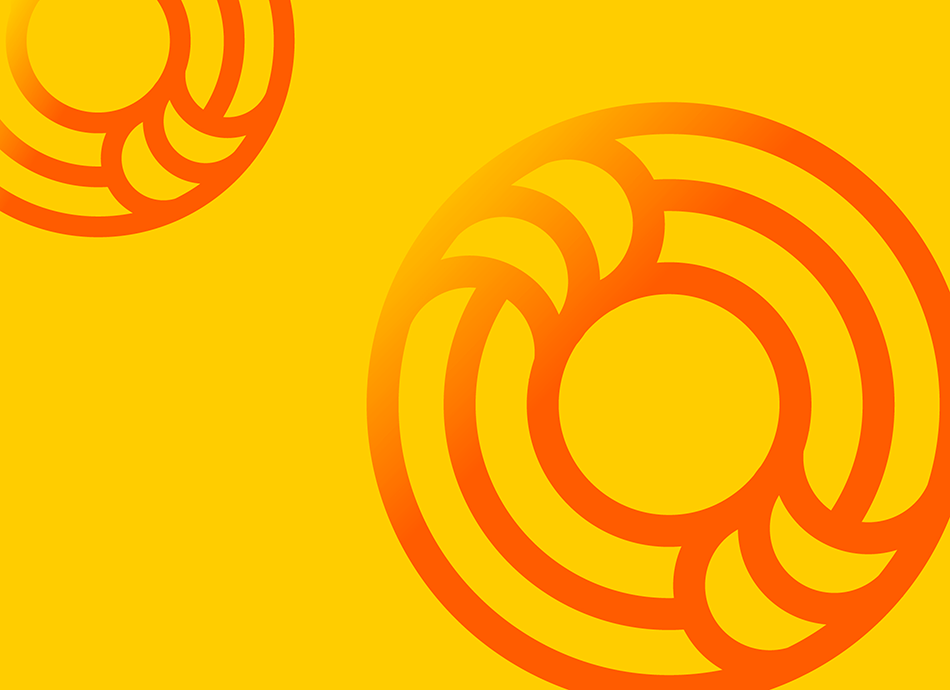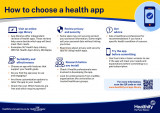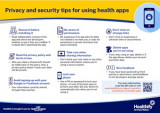If you're a frequent visitor to Healthify, why not share our site with a friend? Don't forget you can also browse Healthify without using your phone data.
How to choose a health app
Consumer guide
Consumer guide – how to choose a health app
- With so many health apps available to download at the touch of a button, it’s often hard to know which ones can be trusted! Are they providing up-to-date, well-researched information?
- To help you out we’ve put together some frequently asked questions so you can make the right choice when deciding which, if any, app to use.

A health app is a piece of software you can download onto your smart phone or mobile device that gives you information and advice on your health, fitness or wellbeing.
Some health apps aim to improve your health and wellbeing by giving you advice on lifestyle changes you can make, eg, getting you moving or making better food choices. But beware! Not all apps are created equal. There’s no legal requirement for health apps to meet criteria to prove they're reliable and secure. Also, the safety and effectiveness of some health apps hasn’t been tested. Some apps might provide incorrect advice or measurements that don’t apply in Aotearoa New Zealand.
A few organisations have reviewed health apps to provide some guidance, but with the huge number of health apps available, and regular upgrades they have, it’s impossible to keep up. You need to take care when choosing a health app to make sure it meets your needs and protects your privacy and security. Below are some things to consider when choosing a health app:
- What do you want from the health app?
- Does the information seem trustworthy?
- Is the app easy to use, and does it suit you?
- Is my data secure and private?
There are so many apps that it can be difficult to choose one you’d like to use. A trusted health app library can be a useful way to find one at a glance. Read more about where to get information about health apps.
When choosing a health app, you will need to think about your needs, health goals, and preferences. Here are some examples:
- Health information and education: Health apps often have educational resources, articles, videos, or tools that can help you learn more about health conditions, treatments, and lifestyle changes. This information may help you make healthier choices and manage your health better.
- Tracking and monitoring: Health apps can help you record your exercise, sleep patterns, nutrition, medicines, and vital signs (eg, blood pressure, pulse). By monitoring these over time, you can track health habits which can help you make decisions to improve wellbeing.
- Goal setting and motivation: Many health apps help you set health goals, eg, weight loss, fitness targets, or better sleep quality. These apps can give you recommendations and track your progress. Some have features to help you stay focused and motivated to reaching your goals.
- Consultations and support: Some health apps offer telemedicine or telehealth services, so you can connect with healthcare professionals remotely for advice, diagnosis, or treatment. These apps can help people who have trouble accessing healthcare services or prefer the convenience of online support.
- Community and social support: Many health apps include social interaction and support, eg, online communities, forums, or group activities. This sense of community can help to encourage or motivate you which can help you to reach your health goals. Be aware that discussion boards or group chat rooms, where users can share their experiences may not monitored by a health professional so the advice or suggestions may not be safe or effective for you or your condition.
When deciding which app to use, it’s important to know why you need to use the app and which functions you’ll use the most. You can then compare different apps and work out which one is right for you.
The credibility and trustworthiness of a health app is important to think about because you want to choose an app with accurate and reliable health information. Here are some ways you can assess this:
- Source of information: Look for evidence of the sources of information within the app. Information from medical institutions, healthcare professionals, or peer-reviewed studies make them more reliable.
- Professional endorsements: Endorsements or partnerships with healthcare organizations, medical professionals, or academic institutions are more likely to have accurate information and advice.
- Sponsorship: Apps that are sponsored by a respected patient group, medical school, university, non-profit healthcare organisation or government agency are more likely to be trustworthy.
Sometimes organisations, companies or individuals may benefit from you using the app, and there may be a risk that the information is biased towards their products. An example is a drug company or healthcare company that manufactures medicines or products related to the app. If you can't find any information about the publisher of the app, or if it's published by a company that could benefit from you using a particular product, be cautious.
Note: User ratings don’t always reflect an app’s evidence or accuracy.
Usability refers to how simple it is to use the app.
- The app should be clear, with easy-to-understand menus and buttons.
- Users should be given clear instructions on how to use the app's features.
- The layout and design should be consistent to improve user experience.
Suitability refers to how well the app meets the needs of its users, and fulfils its purpose.
- A health app should be suitable for its users. The app should help to support health needs or goals of its users, eg, managing long-term conditions, tracking fitness, or providing medical information.
- On some apps the user can personalize the layout, settings, and reminders to suit their preferences and habits.
To measure the usability and suitability of a health app, developers should get feedback from real users to improve the app. Updates based on user feedback helps to improve the health app over time.
Cost of the app and app charges
When choosing a health apps, also check the cost of the app and app charges. App charges may be as a one-off payment or as an ongoing cost. Many apps have advertisements (ads) or in-app purchases. When you use a free app, advertising may be used to cover the costs of developing and maintaining the app. As a result, ads may appear while you are using the app. Sometimes, advertisers may collect data about your usage preferences, and behaviours within the app. This data can then be used to target you with advertisements, even when you're not using the app. Read more about charges and apps.
Aotearoa New Zealand relevance
Some health apps aren’t suitable, or relevant, for New Zealanders as many are designed overseas and use different guidelines and recommendations. Be aware that other countries may use different measurement systems.
- In Aotearoa New Zealand we use the metric system (eg, kilograms and centimetres) but some countries use the imperial system (eg, pounds and inches).
- On some apps you can choose the measurements you use, but on others you can't – which can make it harder to understand.
- New Zealand also uses a different measurement for blood tests, eg, glucose or cholesterol levels. The units can’t easily be converted.
Some health apps collect personal information and have poor security. This means it's not always possible to control who accesses your data, and whether you are informed about your data being accessed.
Privacy of data is important, especially if the app collects data about your medical conditions, treatments, and lifestyle choices. If your personal health data is leaked someone might use it for their own gain.
Although apps may have a privacy policy that says they protect the privacy of your information, they may use that data unencrypted (not coded) and over unsecure network connections. This puts it at risk of being accessed by someone else. Read more tips to improve your privacy and security when using apps.
Security and privacy in health apps is important to protect users' sensitive information, and comply with regulatory requirements.
App libraries and independent review websites
A health app library is a collection of apps or online courses designed for mobile devices or computers that focus on health and wellness. These apps can cover fitness tracking, nutrition monitoring, mental health support, medicines management and more.
- Health app libraries can be selected by organizations, eg, healthcare providers, or government health agencies.
- They often have a selection of recommended apps that meet certain quality, security and privacy standards.
- Users can browse through the library to find apps that suit their own health needs and goals.
- These libraries might also include reviews, ratings, and resources, to help users choose which apps to download and use.
- Examples of health app libraries include: NZ Health App Library, ORCHA Health App Library(external link), Mindapps(external link) and Mind app library(external link)
Healthcare providers
Your healthcare provider may recommend health apps that suit your health needs or conditions. They may be able to give advice on which apps match your treatment plan or wellness goals.
References
- Upfront: Personal technology for health – curiosity or clinically useful?(external link) BPAC, 2015, December
|
Disclaimer: THe NZ Health App Library is a free consumer service to help you decide whether a health app would be suitable for you. Our review process is independent. We have no relationship with the app developers or companies and no responsibility for the service they provide. This means that if you have an issue with one of the apps we have reviewed, you will need to contact the app developer or company directly. |
Factsheets – using health apps safely

How to choose a health app
Healthify He Puna Waiora, NZ

Privacy and security tips for using health apps
Healthify He Puna Waiora, NZ
Credits: Healthify editorial team. Healthify is brought to you by Health Navigator Charitable Trust.


